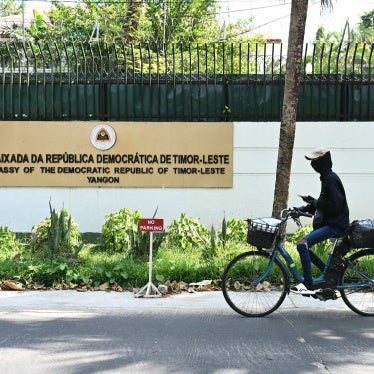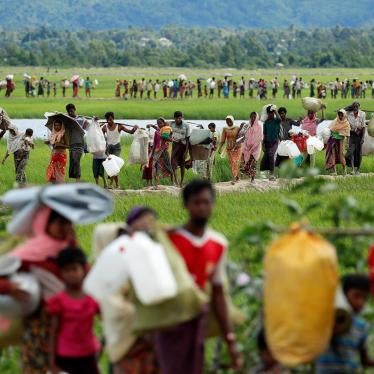In Egypt the human rights situation is deteriorating gravely. The authorities continue to implement a new law effectively banning protests and to jail and try political opponents in legal proceedings that flagrantly violate due process rights. Since July 2013, at least 22,000 people have faced arrest or criminal charges, according to government figures. Detainees have described widening use of torture and incommunicado detention that harkens back to the darkest days of the Hosni Mubarak era. The military has retained its ability to try civilians under the new constitution. A highly politicized judiciary repeatedly renews pre-trial detention orders with little or no evidence. Speedy mass trials have relied solely on police evidence and resulted in hundreds of death sentences.
The government has banned the Muslim Brotherhood, its political party,the Freedom and Justice Party, and the secular April 6 Movement, a main supporter of the 2011 uprising, and designated the Brotherhood a terrorist group. In July and August 2013, security forces methodically opened fire on Brotherhood sympathizers encamped at mass sit-ins, killing at least 817 people in acts that likely amount to crimes against humanity. Brotherhood Supreme Guide Mohamed Badie and other members have been sentenced to death, and Khaled al-Qazzaz, a former foreign policy advisor to Morsi, has been held without charge for more than a year. High profile secular activists including April 6 Movement founders Ahmed Maher, Mohamed Adel, dissident Alaa Abdel Fattah, and human rights defenders Yara Sallam and Mahienour al-Masry, have all been imprisoned for breaking the November 2013 protest law. A court convicted political activist Alaa Abdel Fattah in absentia in June and sentenced him to 15 years in prison for breaking the same law. Although he was entitled to an automatic retrial, authorities detained him for three months and only released him on bail on September 15. He still faces a retrial.
Accountability remains seemingly impossible: to date, there has been no credible investigation of any police or army officer for the mass killings in 2013 – the worst such incident in Egypt’s modern history. Human Rights Watch calls on the Human Rights Council to condemn these continued abuses, urges the Egyptian government to release all political prisoners and ensure full accountability for mass killings of protesters.
In the past year, activists in China have increasingly faced imprisonment and criminal detention. They have been subjected to torture, detained in psychiatric facilities and house arrest. Harassment and intimidation against them remain routine. At this time last year, Cao Shunli was detained at Beijing Airport, en route to a training session on China’s Universal Periodic Review here in Geneva; she died after months in detention in March. And on this day, Uighur scholar IlhamTohti is being tried in Urumqi on highly politicized charges of “separatism,” reflecting the Chinese government’s extraordinary intolerance of peaceful criticism.
The situation in Xinjiang has deteriorated significantly. During Ramadan this year, Uighurs endured additional prohibitions on the freedom of religion and expressions of cultural identity, including the wearing of beards and headscarves. Human Rights Watch is concerned about the way in which China is prosecuting alleged "terrorists" blamed for the violent attacks in 2014—in some cases death penalty sentences have been handed down. Given the lack of independent information about these cases apart from official media reports, the government’s insistence on expediting criminal procedures, and China’s checkered record of torture in police interrogation, the rights to fair trials of these individuals remain a grave concern. Authorities have a responsibility to provide public safety, but not at the expense of arbitrary restrictions on the freedom of expression and the right to a fair trial.
In Hong Kong—the rights to political participation and free expression through universal suffrage—were dealt a significant blow in late August. The central government has stipulated that it will use a political litmus test to determine which three or four individuals will be allowed to run for chief executive. Journalists and media owners, many critical of the Chinese government, have faced harassment or attack in recent months forcing some to close down. In February, a prominent editor, Kevin Lau, was stabbed though he survived the attack; in July, HouseNews, a popular independent news website known for its support for democracy in Hong Kong, shuttered after its founder cited fear of political retribution from China; over the year Jimmy Lai and his media empire known for critical reporting of China were repeatedly threatened and their computer systems hacked. Activists do still intend to launch the “Occupy Central with Love and Peace” movement, though they face a heightened risk of harassment, arrest, or violent dispersal at the hands of the central and local government.
China has 13 outstanding requests for visits by Special Procedures and did not live up to the promise made to the former High Commissioner to invite her to visit the country. The Human Rights Council should consider the situation in China urgently given heightened repression and lack of cooperation of China with key UN human rights mechanisms.
Lastly, the Council should not delay action on Bahrain any longer. The recent arrest of Mariam Al Khawaja and continued repression of others warrants immediate action.








